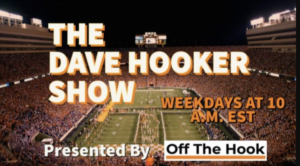Let’s face it. Tennessee’s receiver production has been disappointing this season. Whatever the reason, there is no debating that more was expected out of the Vols’ highly touted crew of pass catchers this season. That doesn’t mean it’s time to point fingers.
In fact, I’d argue that the Vols never had a chance to truly get off the line of scrimmage, figuratively, this season against SEC foes due to a number of issues outside of their control. First, Tennessee’s receivers have been forced to play with a multitude of troublesome injuries.
The leader among the Vols’ receivers is senior Bru McCoy and he has been dealing with a frustrating finger issue that makes it much more difficult to catch a pass and probably a bit more challenging when he’s trying to beat press coverage. The injury was most evident when McCoy, who has only caught 20 passes for 289 yards this season and no touchdowns, dropped a pass when he was wide open in the end zone against Alabama.
Junior Squirrel White was expected to fill the uber-important slot receiver role for the Vols, but his shoulder injury has been so bad that it has affected just about every aspect of his game. White has just 20 catches for 230 yards and no touchdowns this season.
Senior Dont’e Thornton has even been affected by a lower leg injury that has caused him to be sidelined at times. He has caught just 12 passes for 365 yards and three touchdowns this season. Injuries aside, there’s another factor beyond their control.
Building chemistry with quarterback Nico Iamaleava has been a challenge and that’s not a knock on the Vols’ redshirt freshman quarterback nor the Tennessee’s receivers. It just takes time. Now, it’s taken a bit longer than expected, but things seem to be coming along, especially after the Vols’ passing offense seemed to come out of its shell in the second half against Alabama.
Statistics alone, even against Alabama, might not be proof that Tennessee is on the verge of a receiver renaissance, dating back to 2022, but game play would certainly seem to suggest as much. The Vols have gotten open downfield much more often in the past two games, against the Crimson Tide and Florida, but Tennessee just hasn’t connected on as many deep passes as one would expect from a Heupel offense.
The Vols seem close to being explosive based on beating defensive backs in recent weeks. What has been the key to getting open downfield?
Tennessee receiver coach Kelsey Pope said better schemes and improved route running have contributed to the Vols being able to run unfettered deep.
“I think it’s a little bit of both,” Pope said. “On the perimeter we see on film every week how close we are to connecting on those big ones. They won’t always happen, but…it’s only a matter of time before you connect on those. And I think ultimately when we do, we’ll feel a lot different.”
Connecting on just one of those passes can change the narrative of a game. With one deep pass, the Vols can go uptempo again and allow things to open up underneath in the passing game and prevent defenses from loading the tackle box against the run. Connecting on even more deep passes can truly make the Vols unbeatable considering how well Tennessee can run the ball and play elite defense.
One would think the bye week would help the Vols’ chemistry in the passing game, which seems closer to clicking each and every week.
“Guys have been staying after practice all season long, but being a lot more intentional on that stuff as of late,” Pope said. “Guys are hungry because they sense how close we are. I think they’re willing to do whatever it takes to make sure going down the stretch that we finish strong and we end up making those plays.”
That could not only change the narrative of upcoming games, such as when the No. 7 Vols play Kentucky on Saturday at 7:45 EST. It could also change the entire narrative of the season, from Tennessee being a College Football Playoff contender to a champion.






